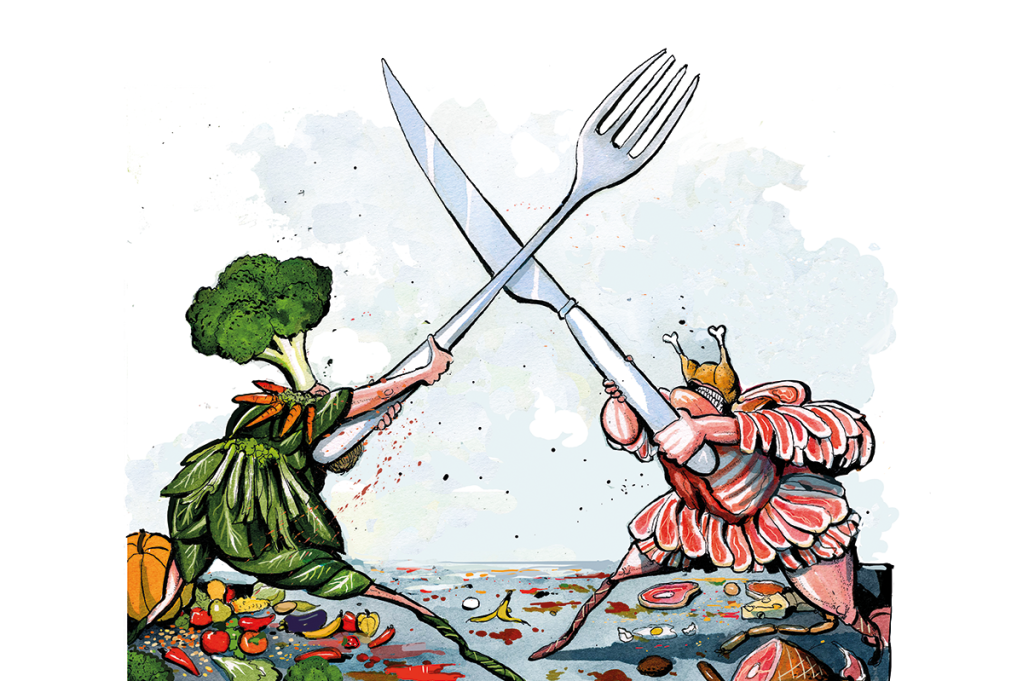My jar of vegan flaczki has been eyeing me for the last four months. It sits in my fridge, large, round and imposing, filled with a lumpy gray mixture. Flaczki is tripe soup, a traditional Polish concoction of broth, herbs, spices, vegetables and guts. Poles adore the stuff. It is warming and hearty. An unimpressed friend once described it as ‘elastic-band stew’.
My vegan flaczki contains mushrooms instead of tripe. I bought it for a lark. My Polish friends thought it funny that a modern, progressive twist was being put on a firmly traditional dish. I am a vegetarian, but every time I think about eating my vegan flaczki, I think again.
Traditional Polish food is warm, rich and meaty. Roulada, for example, is a meat roll stuffed with, among other things, more meat. After hours of choking on coal dust or farming in the bitter cold, no Pole wants a salad and a quiche. While most work has become less arduous, the attachment to hot, thick, high-calorie food has endured. At a wedding, for example, at around midnight, after tons of food, gallons of vodka and hours of dancing, a giant pot of flaczki will be hauled out for the tired guests.
Vegan flaczki might seem novel, but vegetarian alternatives to traditional Polish dishes are proliferating. You can buy gołąbki (stuffed cabbage) with rice and mushrooms instead of meat. You can buy kotlet schabowy (schnitzel) made with soy instead of pork. You can buy bigos, a stew made of cabbage, tomato and pork, with the pork replaced with — more cabbage.
The number of vegetarians and vegans is mushrooming in Poland. Five years ago, I hunted fruitlessly for plain tofu. Now I can find vegan ‘mincemeat’ made from pea extracts. It’s delicious, though I understand it doesn’t sound it. Most restaurants now have vegan options, too, and most larger towns and cities have vegan restaurants. The Happy Cow vegan guide claims that Warsaw is the third-most vegan-friendly city in the world.
But not everyone is happy. The commentator on Poland Daniel Tilles has suggested that vegetarianism is seen as being one in ‘a range of modern, progressive ideas that together threaten the traditional way of life, including Poland’s dominant Catholic faith’. Figures such as the respected priest, academic and author Andrzej Zwoliński associate vegetarianism with subversive forces like eastern spirituality, radical leftism and, well, Adolf Hitler.
With the exception of Adolf, this is not wholly unfair. Vegetarians do tend to be leftists, and they’re often ‘spiritual’ or secular. Only two percent of American conservatives are vegetarians or vegans, compared to 16 percent of liberals. I doubt that the Polish ratio differs dramatically.
Many Poles have a hereditary aversion to vegetarian products. Frankly, I can see how my mushroom-heavy jar of vegan flaczki might offend a Pole. To understand the sense of wounded propriety and disgust that they might experience, imagine the face of your Italian grandmother if she saw you spurning olive oil and squeezing ketchup onto a slice of frozen pizza.
There is something a little petty about this. If I eat a vegetarian burger, that does not preclude you from eating a beef burger. But vegetarianism bears the whiff of judgment and — critically when it comes to politics — the implication that the old ways are worse than the new. It’s hardly a surprise if it makes conservatives defensive. As a vegetarian on the right side of the political plate, I would argue that there is nothing ‘traditional’ about modern livestock production. Pigs and cows are herded into cramped, crowded barns that bear as much resemblance to the farms of old as an apartment block bears to a cottage. The creatures are fattened, killed and carved up with sloppy efficiency, in a process few of us will ever have to glimpse. Farming, for me, is not immoral when the animals have freedom and their meat is a nutritional necessity. But when their lives are this grim and we have other options, it becomes questionable.
I do not expect most people to agree with this. I eat what I like, and if anybody wants to have an argument about it, I make my case. But I will not invite friends around for cabbage with cabbage and tell them with a straight face that I am serving bigos.
After a tough day at work, I would rather eat pierogi or soup, or a sandwich, or a months-old lump of cheese covered in mold and fluff. But I must make myself eat the vegan flaczki. It slops into the pan, a big lump of mushroom, onion and coagulated vegetable fat. I mash it up into soupy consistency. When it is hot, I tip it into a bowl. My fiancée and I eat it. I suggest that it is ‘quite nice, if a little greasy’. She says it is the most disgusting thing that she has ever eaten.
This article was originally published in The Spectator’s May 2021 World edition.


















